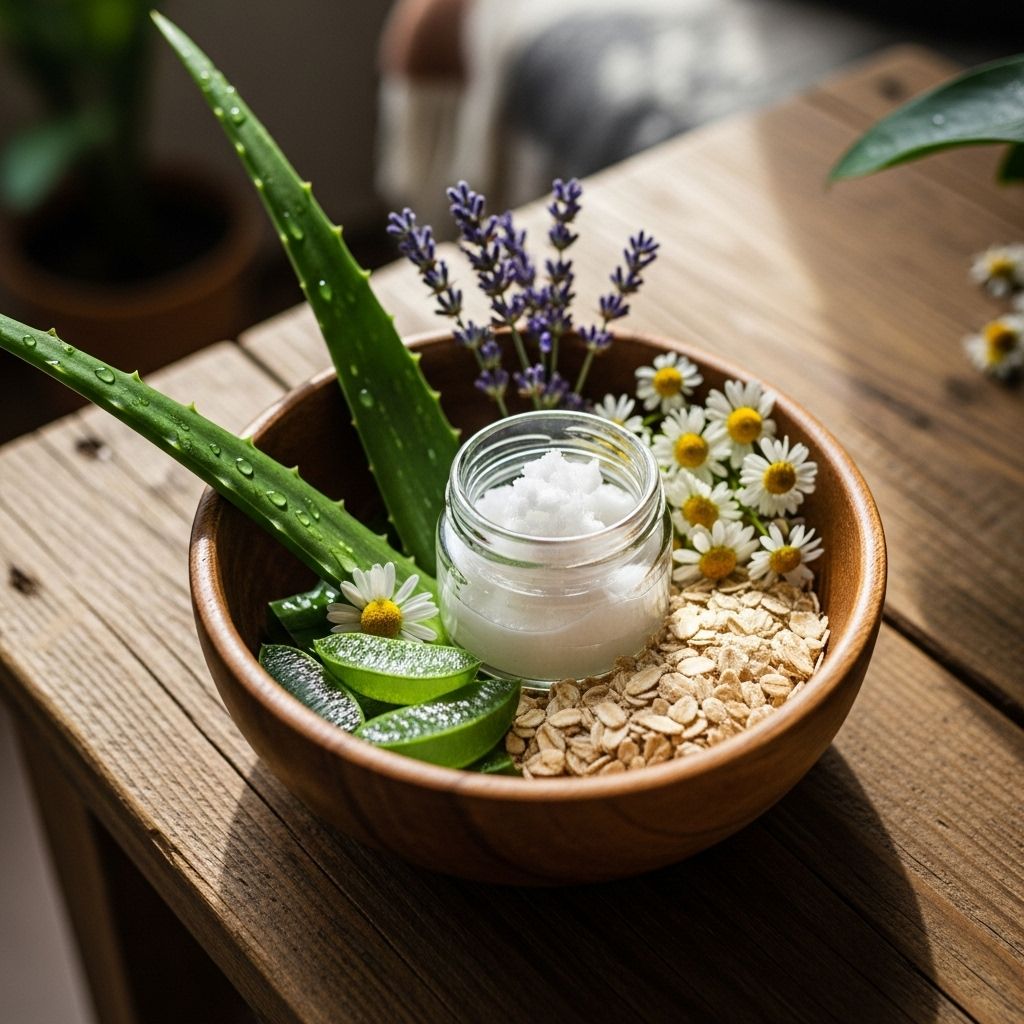12 Effective Home Remedies to Relieve Psoriasis Symptoms
Discover science-backed home strategies to soothe psoriasis symptoms and promote healthier skin every day.

Psoriasis is a chronic, autoimmune skin disorder characterized by thick, scaly plaques that can be itchy, painful, and deeply frustrating. While medical treatment is crucial, home remedies can play a significant role in managing everyday flare-ups, soothing symptoms, and improving your quality of life. This comprehensive guide covers practical, scientifically grounded strategies to keep your skin as healthy and comfortable as possible.
What Is Psoriasis?
Psoriasis occurs when the immune system triggers the rapid growth of skin cells, leading to red, silvery, or purplish patches mostly on the elbows, knees, scalp, and trunk. While not contagious, it’s a chronic condition that tends to wax and wane with various triggers—including stress, diet, injury, and infection. Living with psoriasis often means combining prescribed treatments with daily self-care measures at home.
1. Moisturize Frequently and Deeply
Regular, generous moisturization is one of the simplest and most effective forms of relief for psoriasis. Thick, fragrance-free creams and ointments—as opposed to thin lotions—work best to form a protective seal and help lock in skin moisture.
- Apply moisturizer immediately after bathing to trap residual dampness.
- Look for products labeled “for sensitive skin,” without alcohol or strong fragrances.
- Try products with ingredients like shea butter, ceramides, glycerin, or mineral oil for extra hydration.
Consistent moisturization can ease scaling, itching, and cracking, promoting a softer and more pliable skin surface.
2. Soak Up Some Sun—but With Caution
Sunlight exposes your skin to UVB rays, which can slow the rapid cell turnover at the core of psoriasis.
- Start with just 5–10 minutes of unprotected sun exposure on affected areas, 3–4 times a week.
- Apply a broad-spectrum SPF 30+ sunscreen to healthy skin and avoid sunburn, which can worsen psoriasis.
Discuss with your dermatologist before starting sun therapy, especially if you’re on photosensitizing medications.
3. Limit (or Avoid) Alcohol
Alcohol—especially in excess—has been associated with psoriasis flare-ups and reduced treatment effectiveness. Cutting back can help improve your overall skin health and may make medications more effective.
4. Spice Up Your Bath for Soothing Relief
Taking a warm—not too hot—bath can soften plaques and ease itching. Consider adding the following ingredients to your bathwater:
- Colloidal oatmeal: Calms inflammation, reduces itching, and forms a gentle barrier over the skin.
- Epsom salts: The magnesium content helps with irritation and scaling.
- Baking soda: Dissolve 1/3 cup in water for a compress to soothe itching.
- Apple cider vinegar: Add a cup to bathwater or mix with equal parts water for a DIY scalp rinse. Never use on cracked or bleeding skin.
Always follow up with a thick moisturizer while the skin is still damp to seal in moisture.
5. Try Aloe Vera for its Cooling, Calming Effect
Aloe vera gel—against sunburn and other forms of irritation—may reduce redness and scaling for those with psoriasis. Choose creams or gels with at least 0.5% pure aloe. Apply as needed to plaques, but avoid internal consumption.
6. Food Fixes: Eat an Anti-Inflammatory Diet
While no diet can cure psoriasis, dietary choices may influence the frequency and severity of flares. Consider these strategies:
- Increase oily fish: Salmon, sardines, mackerel, and tuna are high in omega-3 fatty acids, which may reduce skin inflammation and itching.
- Add turmeric: Its active ingredient, curcumin, has antioxidant and anti-inflammatory actions—a potential benefit in psoriasis management.
- Try probiotics: Found in yogurt and fermented foods, probiotics support a balanced gut microbiome, which may help modulate immune activities related to psoriasis.
- Avoid trigger foods: Some people notice flares with dairy, gluten, or processed foods. Consider keeping a food symptom diary.
7. Soothe Scalp Psoriasis with Apple Cider Vinegar
Some with scalp psoriasis report relief from itching and scaling by rinsing with a mixture of apple cider vinegar and water (1:1 ratio). Never use on broken skin. Discontinue if it causes burning or irritation.
8. Oatmeal Baths: Gentle Yet Powerful
Colloidal oatmeal (oatmeal ground into a fine powder) baths can provide gentle, immediate relief from itching and irritation. You can buy commercial colloidal oatmeal products or grind whole oats at home.
- Add 1–2 cups of finely ground oatmeal to a warm tub and soak for 15–20 minutes.
- Rinse gently and moisturize right after your bath.
9. Cover Cracks with “Cow Cream”
For deeply cracked or dry skin, some patients use Bag Balm—a lanolin-rich ointment originally developed for cow udders. It helps seal cracks and restore moisture, making it easier for skin to heal and reducing the risk of painful splitting.
10. Calm Itching with Kitchen Staples
Beyond oatmeal and baking soda, try these kitchen-based remedies:
- Soak a clean washcloth in cool water, wring out, and apply to irritated skin for temporary relief.
- Add a cup of apple cider vinegar to your bath and soak, especially for areas that are not cracked.
11. Take Care of Mind and Body
Stress management is essential: Emotional and physical stress are well-known psoriasis triggers, capable of provoking or worsening breakouts.
- Practice deep breathing, meditation, or yoga.
- Engage in hobbies or activities that relax you.
- Consider cognitive behavioral therapy or support groups for additional help.
12. Guard Against Infection and Injury
Psoriasis can be aggravated by infections and skin injuries. Even a small scrape can set off new lesions in a phenomenon known as the Koebner effect.
- Take steps to avoid cuts, scrapes, and burns whenever possible.
- Treat wounds promptly and keep skin clean.
- Protect your skin with gloves or appropriate clothing when working outdoors or with harsh chemicals.
Other Noteworthy Remedies
- Coal tar: Available as ointments, shampoos, or soaps, coal tar encourages the shedding of dead skin and reduces inflammation. Note: It can stain clothing and has a strong odor—try it sparingly and speak to a dermatologist before regular use.
- Salicylic acid: This beta hydroxy acid, often used in acne treatment, can reduce the thickness of psoriatic plaques. Use on small areas first to test for irritation.
Frequently Asked Questions (FAQs)
What is the fastest way to soothe a psoriasis flare?
Apply a thick, fragrance-free moisturizer, take a lukewarm oatmeal bath, and use doctor-recommended topical treatments. Consider applying a cool compress to inflamed areas.
Which foods are good (or bad) for psoriasis?
Fish rich in omega-3s, fruits, and vegetables are generally beneficial. Avoiding processed foods, excessive alcohol, sugar, and known personal triggers may help minimize flares.
Can stress really worsen my psoriasis?
Yes. Psychological and physical stress is a validated trigger for psoriasis flares. Incorporating stress reduction techniques like meditation or yoga can be helpful.
Is coal tar safe for everyone?
Coal tar is effective for many, but it can irritate sensitive skin and may stain. Always do a patch test and consult your dermatologist before routine use.
When should I see a doctor about my psoriasis?
If home remedies do not control your symptoms, or if you experience pain, open sores, signs of infection, or emotional distress, seek medical guidance. Prescription treatments may be required for moderate to severe psoriasis.
Psaoriasis Home Remedies Quick-Reference Table
| Remedy | How It Helps | Notes |
|---|---|---|
| Moisturizer | Locks in hydration, softens scales | Choose fragrance-free, thick creams |
| Oatmeal baths | Reduces itching, soothes inflammation | Use colloidal oatmeal; moisturize afterward |
| Aloe vera | Calms redness, hydrates skin, anti-inflammatory | Use 0.5% or higher strength; external use only |
| Sun therapy | Slows rapid cell growth, reduces plaques | Short, gradual sessions; avoid sunburn |
| Baking soda compress | Relieves itching | Dissolve in water; apply with a washcloth |
| Apple cider vinegar | Soothes scalp, reduces itching | Mix with water; avoid open or broken skin |
| Coal tar | Cuts itch, reduces scaling | Can stain; strong odor; test first |
| Turmeric/Curcumin | Anti-inflammatory, reduces flares | Add to diet or use supplements with medical advice |
| Stress management | Prevents flares | Practice regularly for best results |
Final Thoughts: Combining Remedies with Professional Care
While these home remedies offer invaluable support, they work best in conjunction with, not as a replacement for, medically prescribed treatments. Consult with your healthcare provider or dermatologist before beginning new therapies, especially if you have severe or persistent symptoms, or if you’re considering supplements or over-the-counter treatments.
By integrating these evidence-based home strategies, you can foster healthier, more comfortable skin and take an active role in managing your psoriasis every day.
References
- https://www.medicalnewstoday.com/articles/314525
- https://health.clevelandclinic.org/home-remedies-for-psoriasis
- https://www.prevention.com/beauty/a20448749/psoriasis-home-remedies/
- https://pmc.ncbi.nlm.nih.gov/articles/PMC10229448/
- https://www.prevention.com/health/a20428711/21-skin-soothing-psoriasis-remedies/
- https://www.prevention.com/health/health-conditions/a20123786/scalp-psoriasis/
- https://www.prevention.com/health/a20499099/plaque-psoriasis-treatment/
- https://www.prevention.com/psoriasis/
- https://www.psoriasis.org/about-psoriasis/
- https://www.mayoclinic.org/diseases-conditions/psoriasis/diagnosis-treatment/drc-20355845
Read full bio of medha deb












